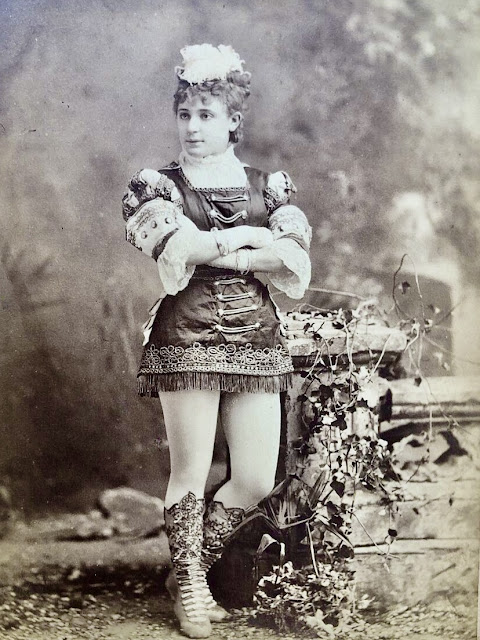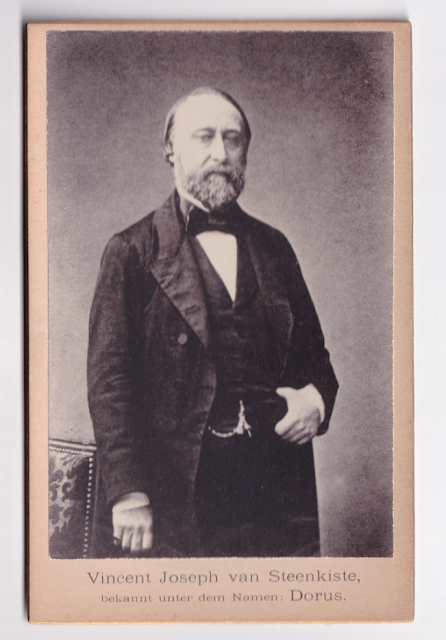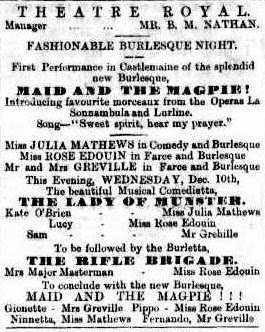Clearing the desktop before closing down the office for re-carpeting .... some pictures ...
WILLIAMS, Marie [WILLIAMS, Maria] (b Prince's Street, Strand, x 27 September 1853; d 30 Bloomsbury Street, London 15 August 1891)
'Marie' was the second daughter of a Clerkenwell bootmaker, James Williams, and his wife Elizabeth. Elder sister, Margaret, became assistant to a perfumer, Marie became a chorus dancer. She is listed as such in the 1871 census, at York Buildings, Charing Cross. Quite where she danced as a teenager I'm not wholly sure. 'Miss Williams' is hardly an unusual name. But there is one such in the Gaiety chorus, and in small parts in the Gaiety tour in 1872, and another in Emily Soldene's company in the early 'seventies. I would think both were possibles. Esecially the latter, for Marie travelled to America with Soldene in 1874, and by 1875 she was supporting the star as La Julienne in La Jolie parfumeuse and in the role of Brigitte in Geneviève de Brabant.
Next, she joined the fine company at the Prince's Theatre, Manchester where she was seen in supporting roles in two Alfred Cellier musicals, The Tower of London (Ursula) and The Sultan of Mocha (Isidora). in the pantomime Aladdin (Krakalotta) alongside Mrs John Wood, J H Ryley and Gaiety soprano Connie Loseby, as Horace to the Tottles of Toole, before joining D'Oyly Carte's pre-G&S company. She appeared as Valentine (ie Fichtel) in his production of the desexed The Duke's Daughter, star, Selina Dolaro, then moved on to Giroflé-Girofla star, Catherine Lewis, and back to Soldene to play the leggy part of Alfred in Chilpéric ('a rapidly improving young actress of burlesque and light comedy parts').
Again at the Prince's she played Audrey to the Touchstone of J G Taylor, more Tottles, Marjorie in a third Cellier piece, Nell Gwynne, François in Richelieu and Anne Bullen with Phelps, and Hafiz in the pantomime, Sindbad. When the American star 'Fanchita' (and, she's ANOTHER story!) fell ill, Marie took over the title-role.
Miss Williams was clearly on an upward trajectory. And she continued that way. 31 March 1877 she opened at the Folly Theatre as a featured member of the famed Lydia Thompson troupe (Oxygen, The Conjugal Lesson, Gig in Robinson Crusoe). But the troupe didn't stay at the Folly. Lydia's company made its healthiest money in dollars, and 12 September 1877 Marie made her return to New York in Robinson Crusoe. Circumstances (see my biog of Lydia) led to the star going home. Manager Colville set up a replacement company starring 'Eme Roseau' otherwise Emeline Rosenquest (and the future Mrs Colville). Marie went along .. much appreciated, as she reported back to Blighty.
 |
| Marie Williams |
But she went home. And stardom didn't happen. Why? I have an idea.
In London, she joined the company at the Royalty Theatre. She supported Nellie Bromley in Venus, played Carabino in Balloonacy, Mrs Vavasour in Themis, Mercury in Cupid ... and took time out to replace Fannie Leslie as principal boy in the Covent Garden panto of Sindbad. She made something of a personal hit in Forbidden Fruit at the Adelphi. And then ... she went off across the Atlantic again! The venture was not successful. She got into bad company and didn't, for some reason, get out as quckly as she should have. In 1881 the press reported 'Marie Williams commanded $150 a week last season. Now Daly gives her $40 ... why?
In 1882 she toured with the Willie Edouin troupe (Aladdin, Babes in the Wood &c) and, after a bit of to and fro-ing across the ocean, ended up at the suburban Standard Theatre as Miss Muffit in Little Red Riding Hood. Between 1882 and 1887 she stayed in Britain. She took supporting roles at Her Majesty's (Queen Popotte in Voyage to the Moon), the Alhambra (Wangenheim in The Beggar Student), with the Vokes Family (original cast of In Camp) and was very visible in pantomime -- Liverpool Alexandra, Islington Grand, principal boy at Drury Lane 1886 and 1887) -- but ....
She elected to go back to America. A better management this time. She was to be leading lady to Henry (Adonis) Dixey in the extravaganza The Seven Ages of Man. So, all was all right? No. It wasn't. And how long it had not been 'all right' we can't know. Marie was epileptic. She was also -- probably since those champagne days -- an alcohlic. It seems she ended up, after court appearance for drunkeness, in the Martha Washington home in Chicago. But she made it home 23 May 1891. Three months later she was dead.
What a waste.
 |
| Clarice Sinico |
One of those grand singers who were always in the shadow of the big name stars. Full-blooded biography of Clarice to be found in my Victorian Vocalists. She wasn't very good at picking her men ...
Dorus
 |
The couple toured in Muldoon's Picnic, Edie became soubrette with the team of Spry and Monti (A Secret Crime, A Man's Ambition), played touring pantomime with James Kiddie and song-and-dance roles with Harry Bruce's company and Miss Emma Rainbow ... and then Herbert -- not yet 40 -- died 'of consumption' (26 November 1897). And Edith left the stage ... and my ken ...
One of two Australian Jewish sisters who made a name for themselves on the extravaganza stage, 'Marion Elmore' was born Mary Ann Nathan in Sandhurst where her father, for a time, tried his hand at theatre management. Her grave gives her birthdate as 22 April 1860, and her sister Selina, known as Lena Merville as 27 June 1861. You would expect the family to know, but the Sandhurst registers have Mary Ann Nathan born 1858. And Lina born 'at sea'. Which sea?
 |
| Lina Merville |
Mr Barnett Moses Nathan who seems to have been a fruit and veg man in Covent Garden married Miss Julia Solomons in 1851, in time for the birth of their first daughter, Julia (28 October). A son, Edward Nathaniel was born 7 November 1852, and another, Louis, c 1855, before the family set sail south. I catch up with them in Adelaide, in 1856, where father is in some kind of business and the law courts. By the end of the year, they have removed to Sandhurst. Nathan seems to have got involved with the Amdrams and, in 1862, I see he has become the manager of the local Theatre Royal. Within the year he was bankrupt.
Now he put the children on the stage. Edward was first, introduced as a juvenile cornet player at his father's Benefit (7 January 1863), but the others would quickly follow.
The bankrupt decamped to Hobart then Adelaide .. and in May 1864 Miss Julia (Irish lilt), Miss Selina (highland fling) and Miss Marion (nautical hornpipe, 'aged 3 years') appeared on the Victoria Theatre's stage. Edward and Louis were heard in duets for two cornets ... and soon 'The Nathan Family' was a featured and well-known kiddie act. How kiddie? Well, in 1867 they advertised as Julia 12, Edward 11, Louis 10, Selina 8, 'la petite Marian' 5. In 1868 it was Edward 12 Louis 10 Julia 10 Cecilia 9 Marion 7. And it would change further. But I'm pretty sure the grave markers in Hastings on Hudson are wrong. La petite Marion was surely the youngest. ('The youngest and smallest of the family') Even if not quite as young as daddy said.
The family act did duty for more than five years, until the kiddies were no longer kiddies and the novelty had gone off the act. So, in later 1870, they packed up and headed for America. Which turned out to be a very good idea. Although it didn't seem so at first. Nathan wrote back to Melbourne (Herald 13 March 1872) describing the horrors of touring the back country in deep snow ..
The Nathan family, Selina Nathan and la petite Marion would soon be gone. And in their place emerged Miss Lina Merville and Miss Marion Elmore. The rest of the family decided to become 'Elmore' as well. Julia jr continued as an actress, Lina and Marion, after splendid careers in some of the very best extravaganza companies on both sides of the Atlantic (notably with fellow 'Australians', Willie Gill and Willie Edouin) worked on into the 20th century, even appearing together in vaudeville. Edward (d 20 January 1928) went on to be a florist and antiques dealer in New York.
Lina had an apparently shortlived marriage to Mr Albert L Levi of Boston 'theatrical manager' (1893), Marion wed stage partner Frank Losee in what would be a long partnership. Lina died in 1920 (4 January) and Marion in 1950 (30 September) 'aged 90'. Sigh.
There are still queries around the facts of this family for me to elucidate. When mother Julia died, in 1908, obituaries related a career of which I know nothing. Actress, singer, songwriter, married Mr Elmore in Sierra Leone (what about the Strand? and Mr Nathan? There WAS no Mr Elmore!). Aunt of Edward Solomon the composer .. but hang on, she was SOLOMONS ... no? No! Goodness, she was the sister of Charley Solomon! Father: Samuel Solomon. Covent Garden, fruit and veg .... well, how about that for a turn up!
When you first start to dig and delve .. but .. Sierra Leone?
 |
Heinrich Wilhem Ernst |
A nice photo of the celebrated Jewish violinist Ernst (b Brno 8 June 1812; d Nice 8 October 1865)
 |
| Robert Soutar, Nellie Farren and ? |
 |
SUTER and FARREN. Tut tut. Everyone know that Nellie Farren was married to Robert SOUTAR. And that's Nellie, all right. But as or in what? I'm sure this photo must exist somewhere correctly labelled. But I've not seen it before. It must be from before 1867, when photographer Walker died.
This rather Bacchic picture from the NPG is from the same studio ... maybe from the burlesque Cupid and Psyche (1864) in which she appeared as Bacchus? 1864-8 she was engaged at the Olympic and I suspect that it is from that period that our photo comes.
Here is a charming portrait of the top-rank British soprano, Helen Lemmens whose very long career is enshrined in a very long article in my Victorian Vocalists
And here one of most attractive dancers to come out of the London 1880s. Alice [Matilda] LETHBRIDGE (b Islington 29 January 1866; d Eastbourne 4 February 1948). She seems to have begun at Xmas 1884, dancing and singing as Pritti-Peri in the Glasgow pantomime of Aladdin. However, she was soon on the London stage, dancing solo in Cherry and Fairstar at the Islington Grand, and on tour doing a solo hornpipe in The Commodore. She featured in the London production of
 |
| Helen Lemmens-Sherrington |
Mynheer Jan (1887) with a Spanish dance, with Kate Santley in Indiana, in Blanchard's Carina (1888 'delights everyone with her graceful and elegant dancing'), and she got married (1889). Her husband was the comic actor H[enry] J[ameson] Turner, with whom she appeared in the 1888 Bristol panto, and she would bear him three daughters before their estrangement and his death in 1898.
 |
| Alice Lethbridge |
She toured with Arthur Roberts in Lancelot the Lovely, danced in Tito Maattei's The Prima Donna, Princess Balroubadour in the Liverpool Aladdin, with Belle Bilton in Augustus Harris's production of the burlesque of Venus ('as dainty a dancer as has ever been seen behind the footlights') before pantomime time came around and she featured as Maid Marian at Birmingham (1890). In 1891, she joined the George Edwardes roster to play Catherine in Joan of Arc and Fettalana in Cinderellen up-too-late before 'by doctor's orders' leaving the Gaiety and heading for Australia to play more of the same. On her return, over a year later, she joined the cast of Little Christopher Columbus (our photo) and, after a long run, tried her hand as a sketch artist on the halls. Her return to the theatre in the burlesque All My Eye-van-hoe lasted but 9 performances, and she sidewound to a revival of Little Christopher, and then to the Alhambra, giving her Marionette's Courtship dance duo with E J Lonnen. She waltzed with Lonnen in the unlucky Baron Golosh (1895) for Frank Wyatt, and the pair then headed for top-billed dates in the halls playing a sketch A Strange Rehearsal with Alice billed as 'the premier skirt dancer of the day'. Which she probably was. Their last tour date of the season was Johannesburg, where they got caught up in the Jameson Raid, but they got home only for Alice to find that her husband had been screwing around. When she said so, the doxy (who, I seem to remember had been a doxy before) sued for libel.
Ted Lonnen mounted a rather inept musical, starring himself and Alice, as Man About Town, at the Avenue in January 1897. It ended before the month did. So it was back to pantomime, touring with Ted (Robbing a Rajah, A Strange Rehearsal) ... and in September the wayward husband died.
At Christmas 1898 she played in the Manchester panto. 'She dances with all the gracefulness and poetry of old' sighed the press. She was but 33.
She toured in A Greek Slave and San Toy ('dances a pas seul as only she can'), went back to Birmingham for another panto, and got mixed up in a virtual vanity production, Hidenseek which managed a forced 50 London performances during which important cast members abandoned ship. Then more panto, where Alice was even more than before just a solo dance 'act' interpolated into the sort-of-action. Back in the Gaiety team (but the touring now, not the London) she swapped San Toy for The Toreador and then got again involved with a not very successful version of an imported (and important) musical The Sweet Girl (1906). But then she got her best engagement.
She remarried. She married a young civil servant who was rising in the ranks ... balletomane and writer Sir Thomas Reginald Saint Johnson (1881-1950) was to become KCMG and Governor of the Leeward Islands. They lived in their retirement at Ocklynge Manor House in Mill Rd, Eastbourne where, in the 1939 census the fifteen years older Alice blithely chopped a decade and more off her age, and where she died in 1948.
 |
| Lillian Grubb |
A short life, but a busy one. Lillian GRUBB (b Baltimore 11 September 1866; d Baltimore September 1890) was the daughter of George W Grubb and his wife Annie. She went on the stage as a young teenager, and can be seen as early as 1881 playing the role of Saphir in a St Louis production of Patience. She joined the chorus of Ford's Olivette, Billee Taylor, La Mascotte troupe, and followed up in the Rice companies (Jeannette in Pop). She also got carelessly married to a two-faced bigamist dude whom she promptly divorced.
It was Rice who gave her the part of a lifetime when she was cast as Talamea, the sculptress, in the hit of the era, Adonis ('Golden Chains', 'The Wall Street Broker') and after long service therein she went on to play with Nat Goodwin's troupe, and at the Casino Theatre teamed with Bertha Ricci and Isabelle Urquhart as the three heroines of The Marquis (Jeanne, Jeannette et Jeanneton) and in the title-role of Madelon (La Petite Mademoiselle).
She remarried (Mrs David Hayman), but her career was dogged by illness, and I see her only, latterly, singing Gianetta in Stetson's Gondoliers company in 1890. She quit that company, insisted she was in perfect health ... and a few months later she was dead. Aged 25. Allegedly of 'malnutrition'.

















No comments:
Post a Comment